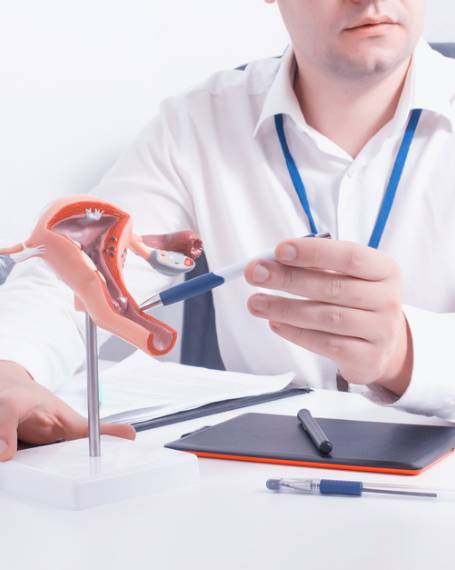Are you suffering from an imbalance of gut bacteria?
Learn more about dysbiosis treatment, effects, causes, and symptoms.
Are you suffering from an imbalance of gut bacteria?
Learn more about dysbiosis treatment, effects, causes, and symptoms.

The gut microbiome refers to an ecosystem of trillions of microorganisms that live in your gut that are essential to your health.
These microorganisms maintain a delicate balance inside your gut and when there is an imbalance of gut bacteria, it can lead to a condition known as dysbiosis, which can lead to stomach issues and other related health conditions, like:
- Digestive problems
- Acid reflux and heartburn
- Irritable bowel syndrome (IBS)
- Inflammatory bowel disease (IBD)
- Food intolerance, gas, and bloating
Once you have dysbiosis, your gut microbiome will not be at the required levels, which may make you more vulnerable to other health conditions.
Getting the right diagnosis and dysbiosis treatment from a physician may help you control and manage this condition.

The gut microbiome refers to an ecosystem of trillions of microorganisms that live in your gut that are essential to your health.
These microorganisms maintain a delicate balance inside your gut and when there is an imbalance of gut bacteria, it can lead to a condition known as dysbiosis, which can lead to stomach issues and other related health conditions, like:
- Digestive problems
- Acid reflux and heartburn
- Irritable bowel syndrome (IBS)
- Inflammatory bowel disease (IBD)
- Food intolerance, gas, and bloating
Once you have dysbiosis, your gut microbiome will not be at the required levels, which may make you more vulnerable to other health conditions.
Getting the right diagnosis and dysbiosis treatment from a physician may help you control and manage this condition.
Diagnosing the imbalance of gut bacteria
Your physician will be able to diagnose your condition through routine methods such as medical history, physical exams, and diagnostic tests.
Some of the tests that your physician might recommend are:
Organic acid tests
This is a non-invasive test where a urine sample is collected and tested to determine the types of acids present in your gut.
Comprehensive Digestive Stool Analysis (CDSA)
This is the most comprehensive test to diagnose dysbiosis. The stool sample will be tested for bacteria, fungi, and yeast.
Hydrogen Breath Test
Involves the patient drinking a sugar or glucose solution and breathing into a special balloon, which is then examined for gases.
Biopsy
The physician may take a sample of the tissue in your gut to determine the types of microorganisms in your gut.
Organic acid tests
This is a non-invasive test where a urine sample is collected and tested to determine the types of acids present in your gut.
Comprehensive Digestive Stool Analysis (CDSA)
This is the most comprehensive test to diagnose dysbiosis. The stool sample will be tested for bacteria, fungi, and yeast.
Hydrogen Breath Test
Involves the patient drinking a sugar or glucose solution and breathing into a special balloon, which is then examined for gases.
Biopsy
The physician may take a sample of the tissue in your gut to determine the types of microorganisms in your gut.

Dysbiosis treatment
If you’re taking any medications and your physician determines that your medication is the cause of your dysbiosis, they may ask you to discontinue it until the balance is restored.
Your physician may also prescribe you antibiotics to treat gut infections, IBS, and urinary tract infections, which can cause and can be caused by dysbiosis.
You may also be able to manage symptoms of dysbiosis through changes to your daily diet, which your physician may help you with in terms of creating a nutrition plan to ensure that you’re getting the right nutrients to keep your gut bacteria in balance.
Nutrients like calcium, B-complex vitamins, zinc, and magnesium are all viable options that your physician might recommend.
Your physician may also ask you to limit or stop consuming items like processed meats, certain carbohydrates and fruits, dairy products, and food with high sugar content.
Food like leafy greens, vegetables, fish, and fresh meat—excluding processed meats—may be recommended to improve gut bacteria.
Seek medical advice from a qualified and experienced gastrointestinal specialist to get the right diagnosis and dysbiosis treatment.
FAQ
How do you know if you have an imbalance of gut bacteria?
Constipation, bloating, gas, stomach cramps, acid reflux, or heartburn happen. But, they are symptomatic of an unbalanced gut. A healthy digestive system will have less trouble processing food and getting rid of waste
How do you fix gut bacteria imbalance?
8 Ways to Improve Your Gut Bacteria, Based on Science
1.Eat a diverse range of foods. …
2.Eat lots of vegetables, legumes, beans, and fruit. …
3.Eat fermented foods. …
4.Eat prebiotic foods. …
5.If you can, breastfeed for at least 6 months. …
6.Eat whole grains. …
7.Eat a plant-based diet. …
8.Eat foods rich in polyphenols.
What does it mean if you have a gut imbalance?
Unintentional weight changes. Gaining or losing weight without changing your diet or exercise habits may be a sign of an unhealthy gut. An imbalanced gut can impair your body’s ability to absorb nutrients, regulate blood sugar, and store fat.
What naturally kills bad bacteria in the gut?
An anti-inflammatory diet, regular exercise, good quality sleep, and probiotics are all strategies to put in place before trying antimicrobials or antibiotics to get rid of bad bacteria.
Schedule an appointment with a gastrointestinal specialist
Obtain guidance from a team of experienced specialists at the Sydney Gut Clinic to treat your gut microbiome imbalances and other gastrointestinal conditions.
Consult a specialist today and get the treatment you deserve.
Sydney Gut Clinic services are only available to patients in Australia.










